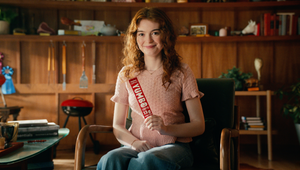
Planning for the Best: Trusting Your Audience with Cecily Long

Cecily (she/her/hers) is an experienced cultural theory specialist who has headed up cultural strategy departments in London and New York. Cecily has worked with clients across the private, public and third sector, on topics as diverse as skate culture, the global podcasting landscape, and emergent craft whiskey. Previously, she served as the head of semiotics in Flamingo London’s global semiotics practice. Career achievements include producing award-winning thinking for clients such as Diageo, Netflix, Vans and Twitter.
LBB> What do you think is the difference between a strategist and a planner? Is there one?
Cecily> I suppose the sharpest distinction you could draw is that a strategist is the person who defines the vision, identifying foundational insights and purpose and crafting high-level strategic direction across everything from marketing to innovation - and maybe then takes a step back. Whereas a planner is the person who ‘stays’ to see that vision through to the end, transforming strategic direction into creative and product ideas, implementing changes across the brand, and measuring the success of new strategies. But I don’t know that it ever plays out that neatly in practice. And I do believe the two roles need to understand each other fully in order to form an effective team. You don’t want to be the kind of strategist who leaves just as the rubber hits the road, and doesn’t understand the realities of implementation.
LBB> And which description do you think suits the way you work best?
Cecily> I aim to be a strategist who does understand those implications. Per my job title, I work in 'Cultural Strategy', but increasingly I think all strategy is cultural strategy.
LBB> We’re used to hearing about the best creative advertising campaigns, but what’s your favourite historic campaign from a strategic perspective? One that you feel demonstrates great strategy?
Cecily> Towards the end of lockdown, Guinness brought back the tagline 'Good Things Come To Those Who Wait' (which they hadn’t used in the UK for many years) with a spot I loved that focused on the pent-up longing for that first visit to the pub after venues re-opened. Deviating from your normal line just as the pubs open back up and you’re trying to cement yourself in people’s minds isn’t the most obvious move, and it could only have been done by a brand like this with such a rich and iconic advertising history to draw on. But it was perfect both for the moment (what more apt message for just post-lockdown than rewarding the patience of those who ‘wait’) and for the brand (the line already enjoyed iconic status in people’s minds), and the meeting of those two things always feels like great strategy - a beautifully neat way of attaching the brand to a near-universal human insight at that time.
LBB> When you’re turning a business brief into something that can inform an inspiring creative campaign, what do you find the most useful resource to draw on?
Cecily> I think creative ideas are often born when an insider perspective meets an outsider one. If I’m thinking about something that’s very foreign to me, I want to talk to someone who’s incredibly embedded in it. What do you get out of this? Why is it such a part of your identity? But if it’s something that’s already very inside my cultural world, I want to talk to a total outsider. What stands out to you? What is incredibly weird about this thing that I’m not noticing, because I’ve been inside it too long? Those tensions often help me focus in on the most creatively fruitful parts of a topic.
LBB> What part of your job/the strategic process do you enjoy the most?
Cecily> I love it when my work brings me into contact with people, or inside cultural spaces, that I otherwise never would have interacted with. Although I enjoy working on a product or a campaign that I personally find cool and aspirational, it’s not my favourite part of the job. I like to design strategy for audiences who are very unlike me, because getting inside their head feels harder in a good way. It always leaves me feeling like the boundaries of my empathy or my understanding have been stretched just slightly.
LBB> What strategic maxims, frameworks or principles do you find yourself going back to over and over again? Why are they so useful?
Cecily> I’m wary of always returning to the same frameworks, because I think that can start to dull your thinking over time. The things I come back to are more principles about how to do the work. Things like always making sure you are looking outward or far afield for inspiration, questioning the brief as much as trying to answer it, stress-testing your ideas by explaining them to a friend who doesn’t work in branding. If all else fails, go for a walk.
LBB> What sort of creatives do you like to work with? As a strategist, what do you want them to do with the information you give them?
Cecily> I love watching and working with creatives who take an insight and transform it into a story, rather than just repeating it back. I see too many ads lately that seem to just be a brand manifesto read out over a montage of aspirational target consumers, and that isn’t creativity to me.
Core to this narrative approach is trusting your audience. They don’t need you to be so literal. They can sit with a story and feel the values and the ideas that are embedded within it.
LBB> There’s a negative stereotype about strategy being used to validate creative ideas, rather than as a resource to inform them and make sure they’re effective. How do you make sure the agency gets this the right way round?
Cecily> Well…I don’t think there’s anything wrong with a creative idea coming first, as long as it’s open to being pressure-tested by a robust strategic interrogation. There are absolutely creative ideas which are brilliant and highly compelling, but not right for that brand at that time. At the same time, creativity isn’t born in a PowerPoint. There’s nothing wrong with having an idea that feels like it comes from left field, and wanting to see if it might have legs. I think the strategist/ creative combination works best not only when creatives aren’t precious about their ideas, but when strategists genuinely respect the creative process - its wandering detours and seeming non-sequiturs.
LBB> What have you found to be the most important consideration in recruiting and nurturing strategic talent?
Cecily> When I’m interviewing someone, I put a lot of emphasis on the quality of their attention. This job is often about finding the patterns in the everyday, or the deeper motivations behind a decision, or the hidden tensions structuring someone’s experience. You want someone who looks at something mundane and finds something strange or interesting in it. And that can be nurtured! But it can also be lost, I think, if you start finding your job routine.
LBB> In recent years it seems like effectiveness awards have grown in prestige and agencies have paid more attention to them. How do you think this has impacted on how strategists work and the way they are perceived?
Cecily> Honestly, in the day-to-day I don’t really see awards affecting the way strategists do their job, or how organisations view them. I don’t think there’s anything wrong with awards, and it’s certainly nice to have work recognised, but the things that have really shifted the way people work have more been around evolving client priorities, new technologies, and new models of understanding research and human psychology.
LBB> Do you have any frustrations with planning/strategy as a discipline?
Cecily> Jargon is for sure the biggest one. I’m not immune to it myself, but when I find myself defaulting to it, it’s inevitably because the underlying idea or argument isn’t strong enough.
LBB> What advice would you give to anyone considering a career as a strategist/planner?
Cecily> The things you’re obsessed with that have nothing to do with brands are what make you special. You can learn how to do marketing, but what you bring to your clients is a sideways perspective, and the wealth of inspiration you have that’s completely outside their cultural sphere. Be passionate about old horror movies, or drag kings, or weird avant garde poetry, or whatever it is you’re actually passionate about. But for God’s sake, don’t be passionate about brands.















